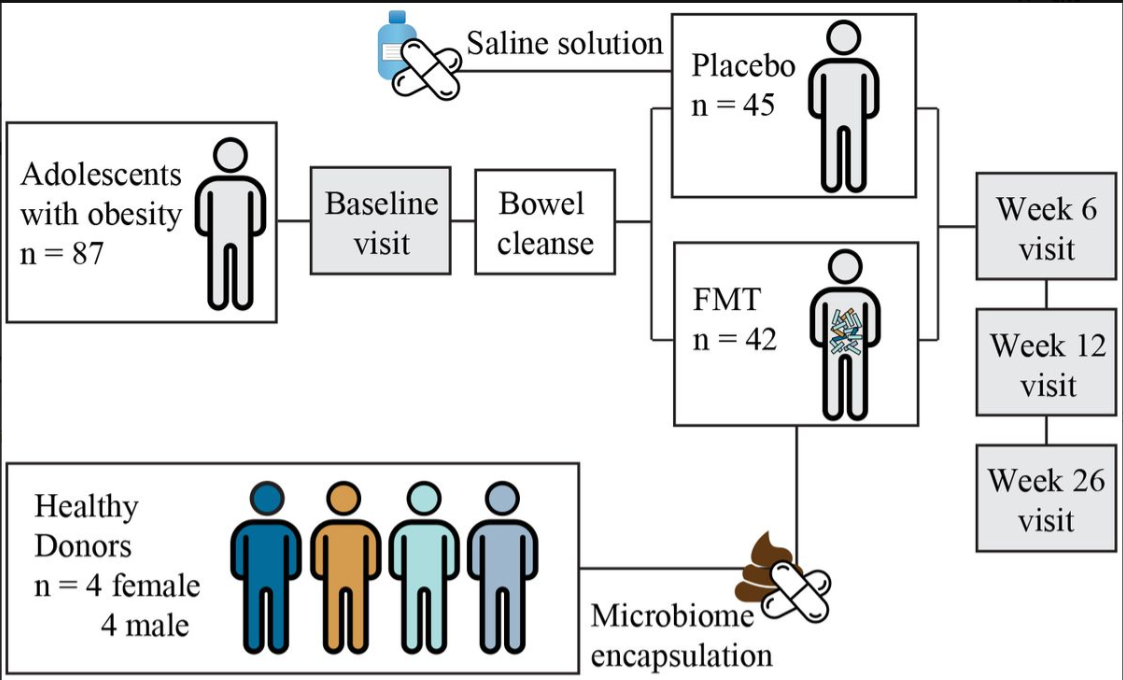💡 Fecal Microbiota Transplantation (FMT) is a therapeutic intervention that modulates the gut microbiome to treat various health conditions. While the impact of FMT on bacterial communities has been studied, its influence on the phageome remains unclear. This study, conducted within the Gut Bugs Trial (GBT), a randomized trial on FMT’s efficacy in adolescent obesity, explores the effects of FMT on recipients’ phage populations over 26 weeks. Shotgun metagenomic sequencing of donor and recipient stool samples reveals stable engraftment of donor phages in recipients, influencing phageome composition, diversity, and variability. Notably, higher donor phageome diversity correlates with increased engraftment efficacy.
📍 FMT is a therapeutic strategy leveraging the gut microbiome, with limited understanding of its impact on phage populations. This study delves into the phageome dynamics following FMT, using data from the GBT, a placebo-controlled trial assessing FMT’s efficacy in adolescent obesity.
📍 Key Findings:
📌 Stable Engraftment of Donor Phages: Donor phages persist in recipients, constituting a significant portion (33.8% ± 1.2% in females, 33.9% ± 3.7% in males) of their phageome over the study duration. Engraftment efficacy varies among donors, and it positively correlates with donor phageome alpha diversity.
📌 Shift in Phageome Composition: FMT induces a compositional shift in recipients’ phageome toward the donor’s composition, reflecting the impact of donor-specific phages. Phageome composition variations observed between male and female recipients align with donor-specific patterns.
📌 Increase in Phageome Diversity and Variability: FMT leads to enhanced phageome alpha diversity and variability over time, indicative of altered microbial population dynamics. Female FMT recipients exhibit higher variability compared to the placebo group.
📌 Microbiome-Phageome Interaction: FMT promotes an increase in microbial diversity and variability, suggesting a shift in population dynamics within the gut ecosystem. Correlation between donor phageome diversity and engraftment efficacy emphasizes the importance of donor selection.
📌 Temperate Phage Dynamics: FMT recipients show an increase in the abundance of temperate phages, possibly indicating a switch from lysogenic to lytic cycles. Further research is needed to discern the role of FMT in influencing temperate phage life cycles.
📍 The findings underscore the significance of phages in FMT-mediated alterations of recipients’ gut ecosystems. Donor phages play a crucial role, and their diversity influences engraftment efficacy. The observed increase in phageome diversity, variability, and shifts in population dynamics provide novel insights into the complex interplay between FMT, phages, and bacterial communities.
📍 This study contributes valuable insights into the less-explored realm of phageome dynamics post-FMT. The stable engraftment of donor phages, coupled with changes in composition, diversity, and variability, highlights the intricate interactions within the gut microbiome. Consideration of donor phageome diversity may enhance the effectiveness of FMT, paving the way for targeted therapeutic interventions and advancing our understanding of the gut ecosystem.
Link to the article : http://tinyurl.com/424ck3pz
